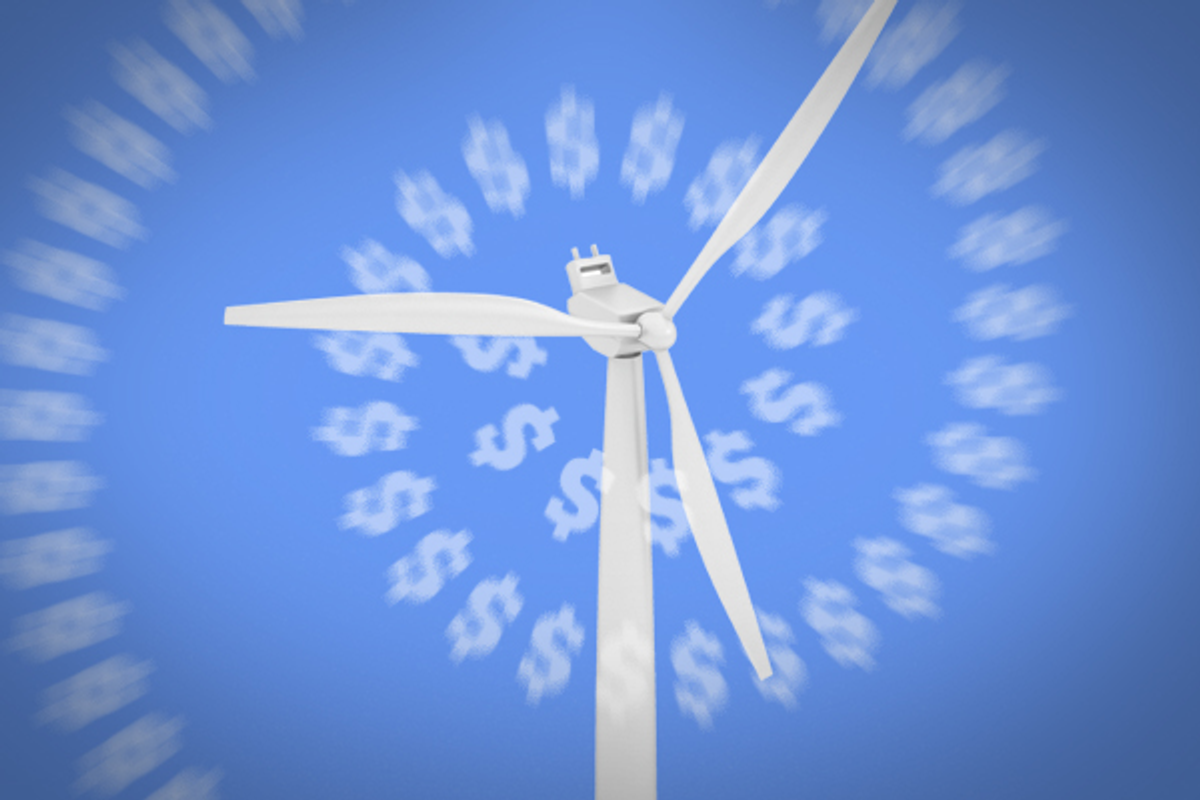Among the standard epithets often leveled at green energy is the one about subsidies. As the conservative myth goes, green energy is allegedly not "cost competitive" with dirty energy sources like coal or natural gas. This, we are led to believe, makes green energy just another wasteful taxpayer-supported boondoggle for dominant special interests. In this version of the story, big, bad all-powerful solar, wind and insulation companies are supposedly getting government handouts to unfairly oppress the earnest mom-and-pop oil and gas industry.
As laughable as it is to portray oil, gas and coal companies -- some of the wealthiest corporations in the world -- as underdogs, the narrative's Machiavellian brilliance should be obvious. For both the global fossil fuel industry and a conservative political movement underwritten by oil barons like the Koch brothers, the mythology self-servingly casts environmentally friendly alternatives as inherently ill-suited to free market economics. In the process, it convinces millions of consumers and entrepreneurs that even if they want to go green, they can't do so in any sort of economically viable way, meaning they should just keep guzzling as much fossil fuel as ever.
But in an up-is-down political arena where being a millionaire is "struggling" and where pure unadulterated fabrication is now the norm, a recent spate of headlines are starting to show us that the true energy story is exactly the opposite of the mythology.
Here's the truth: In the real world that exists outside the media and political theater, fossil fuels rely on massive public expenditures to rig "free" markets against green industries, which don't get nearly the same level of taxpayer support. Indeed, as Bloomberg News reported in 2010, "Global subsidies for fossil fuels dwarf support given to renewable energy sources such as wind and solar power and biofuels" -- and that doesn't even include the subsidies inherent in federal lands being regularly leased for fossil fuel development at bargain basement prices. At the global consumer level, that makes fossil fuels comparatively lower priced than they would be in a true free market, thus encouraging more fossil fuel consumption than ever.
Considering this gross market-skewing inequity, the shocking energy story of 2011 is that a green industry exists at all. And not only does it exist -- it is now suddenly drawing sustenance in a swath of the economy that today seems like a barren desert: the devastated housing market.
Last year, for instance, the National Renewable Energy Lab study showed "that solar homes sold 20 percent faster [and] for 17 percent more than the equivalent non-solar homes." And this was before solar power began its renewed push to hit price parity with fossil fuels. Now, the Los Angeles Times reports "that newly constructed homes with third-party certifications for sustainability and energy efficiency sold for 8 percent more on average than noncertified homes in the six-county Portland metropolitan area" and that "existing houses with certifications sold for 30 percent more."
While more data is still needed to document this shift on a national basis, the trend is clearly real -- and it is clearly an important dose of positive news in an otherwise depressing housing landscape lately more often defined by blight and foreclosures.
Equally important is the deeper meaning of the trend. It shows that the green movement is now being actively rewarded by consumers, even though fossil fuel subsidies are artificially skewing the market against the green movement.
For those looking to preserve the value of their homes in the still-volatile housing market, this is great news. It means green investments (solar panels, insulation, etc.) are a new avenue for potential financial protection. For the planet, it's just as good news -- it means there's an ever bigger financial upside for products that do right by the environment.
Just imagine how huge that market could be if it was subsidized at even half the level of fossil fuels. Suddenly, the world's energy challenges would look a a lot less impossible -- and the global economy might look a whole lot better.



Shares